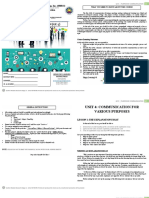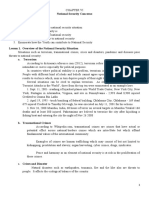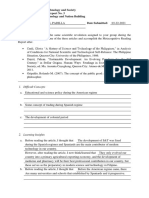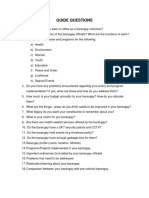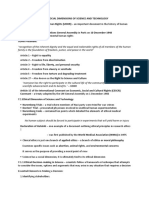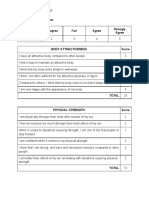9: Recreation, Physical Fitness & Wellness: NSTP 1 - National Service Training Program
9: Recreation, Physical Fitness & Wellness: NSTP 1 - National Service Training Program
Uploaded by
Rexson TagubaCopyright:
Available Formats
9: Recreation, Physical Fitness & Wellness: NSTP 1 - National Service Training Program
9: Recreation, Physical Fitness & Wellness: NSTP 1 - National Service Training Program
Uploaded by
Rexson TagubaOriginal Title
Copyright
Available Formats
Share this document
Did you find this document useful?
Is this content inappropriate?
Copyright:
Available Formats
9: Recreation, Physical Fitness & Wellness: NSTP 1 - National Service Training Program
9: Recreation, Physical Fitness & Wellness: NSTP 1 - National Service Training Program
Uploaded by
Rexson TagubaCopyright:
Available Formats
NSTP 1 – NATIONAL SERVICE TRAINING PROGRAM
CHAPTER 9: RECREATION, PHYSICAL FITNESS & WELLNESS
Recreation
Recreation pertains to activities done for leisure to promote a person's well-being and growth. It brings about a
sense of mastery, achievement, exhilaration, acceptance, satisfaction, success, personal worth, and pleasure. It
enforces a positive self-image. It is also a means to socialize, meet people, and gain new friends.
Characteristics of Recreation
1. Involves voluntary choice and participation of the individual
2. Includes physical activities that are well organized, date and time-flexible, suited to the individual's needs,
and controlled by the individual in terms of location, time, clothing and equipment, and other conditions.
3. Focuses on the individual's participation more than on the results. 4. Accessible and available to all regardless
of socio-economic status, age, sex, and disability.
Physical Fitness
Proper diet, sufficient rest, and regular exercise help keep the body healthy. Being physically fit enables a
person to perform tasks successfully with vigor and alertness and without feeling tired.
Physical fitness is a measure of the body's ability to function efficiently and effectively, resist diseases, and
confront emergency situations. It is important not only to athletes but also to everyone. It does not simply mean
exercising regularly. It refers to a person's overall strength, flexibility, endurance of the heart, lungs and
muscles, and body composition. It includes nutrition and mental health. Here are some key concepts about
physical fitness:
1. When exercising, the lungs take in additional oxygen which is fuel for the heart and brain.
2. Being fit enables the body to fight off illnesses and diseases.
3. Exercise helps reduce stress and tension. Strenuous exercise stimulates the body to release endorphins. These
endorphins produce a happy feeling in people.
4. Exercise strengthens the bones, which makes doing the daily tasks easier. It helps heal major injuries.
5. Exercise helps a person lose weight. When a person is in shape, he/she has increased muscle mass. Since
muscle burns more calories than fat, this means a person's body uses up more calories and stores less of them as
fat. Lower body fat is also associated with a longer lifespan.
6. Exercise helps strengthen the heart, lungs, and immune system. 7. Regular exercise reduces the risks of high
blood pressure, high cholesterol, diabetes, and some types of cancer. 8. Exercise keeps the mind sharp, even as
it improves brain function.
9. Being fit does not mean possessing a muscular build. 10. Regular exercise helps a person sleep faster, better,
and longer.
Components of Physical Fitness
In its most general meaning, physical fitness is a state of good physical health. Physical fitness is to the human
body what fine-tuning is to an engine. It enables people to perform to their maximum potential and helps them
look and feel good. It affects their state of mind and influences, to some degree, their mental alertness and
emotional state
Physical fitness involves the following components:
1. Cardiovascular endurance-the ability of the body to deliver oxygen and nutrients to tissues and to remove
wastes over sustained periods of time
2. Muscular strength and endurance-the ability of the muscle to exert force for a brief period of time.
3. Muscular endurance-the ability of a muscle or group of muscles to sustain repeated contractions or continue
to apply force against an inert object.
REXSON D. TAGUBA, LPT
GURO SA FILIPINO
NSTP 1 – NATIONAL SERVICE TRAINING PROGRAM
4. Flexibility--the ability of the body to move joints and use the muscles' full range of motion
5. Body composition--the body in terms of lean mass (muscles, bones, vital tissues, and organs) and fat mass.
The optimal ratio of fat to lean mass is an indication of fitness. Performing the right set of exercises can help
people get rid of body fat and increase or maintain muscle mass.
Benefits of Regular Physical Activities
The health benefits of regular exercise or physical activities are hard to ignore. The following are some ways on
how exercise can help improve your life.
1. Exercise helps control weight.
Exercise helps prevent excess weight gain and maintain weight loss. When you engage in a physical activity,
you burn calories. The more intense the activities, the more calories you burn. If you cannot do an actual
workout, be more active throughout the day in simple ways such as taking the stairs instead of the elevator or
walking the extra two blocks instead of riding the bus.
2. Exercise helps prevent heart diseases.
No matter what your current weight is, being physically active helps boost high-density lipoprotein (HDL), or
good cholesterol and decrease low-density lipoprotein (LDL) or bad cholesterol which can form plaque that can
narrow the arteries and eventually lead to heart attack or stroke.
3. Exercise helps improve mood.
Regular exercise helps make you feel good; when you feel good, you feel confident and happy.
4. Exercise helps boost energy.
Regular physical activity helps improve muscle strength and endurance and the cardio-respiratory system.
When your heart and lungs work more efficiently, you have more energy to go about your daily chores.
Exercise helps increase the level of brain chemicals that aid you in learning.
5. Exercise helps enhance learning.
As a general goal, aim for at least 30 minutes of physical activity every day. Remember to check with your
doctor before starting a new exercise program, especially if you have any health conditions.
Wellness
According to the American Heritage Medical Dictionary, wellness is "the condition of good physical, mental,
and emotional health, especially when maintained by an appropriate diet, exercise, and other lifestyle
modifications." It is further defined by the Mosby's Medical Dictionary as "a dynamic state of health in which
an individual progresses toward a higher level of functioning, achieving an optimum balance between internal
and external environments." Wellness is an expanded idea of health and both health and wellness are terms that
mean the ability to live life fully with vitality and meaning.
Six Dimensions of Wellness
Wellness is a dynamic process of change and growth. Fahey et al (2001) give the following dimensions of
wellness:
1. Physical wellness is developed through the combination of beneficial physical activity/exercise and healthy
eating habits and lifestyle. It builds up muscular strength and endurance, cardiovascular strength and endurance,
and flexibility.
Physical wellness is also concerned with developing personal responsibility for your own health such as
caring for minor illnesses and knowing when professional medical attention is needed, monitoring your own
vital signs and understanding your body's warning signs, and recognizing the effects of nutrition on how your
body performs. The physical benefits of looking and feeling good most often lead to the psychological benefits
of enhanced self esteem, self-control, determination, and a sense of direction.
REXSON D. TAGUBA, LPT
GURO SA FILIPINO
NSTP 1 – NATIONAL SERVICE TRAINING PROGRAM
2. Emotional wellness is rooted in how you accept and manage your feelings, understand your limitations,
navigate through stressful situations, and maintain healthy relationships. This includes the degree to which you
feel positive and enthusiastic about yourself and your life. It is better to be aware of and accept your feelings
than to deny them. It is better to be optimistic than to be pessimistic in your approach to life.
An emotionally well person is able to express feelings freely and effectively, form and sustain satisfying
interdependent relationships with others based on mutual commitment, trust, and respect, and take on
challenges, risks, and conflict. As he/she manages his/her life in personally rewarding ways and takes
responsibility for his/her actions, he/she sees life as an exciting, hopeful adventure.
3. Intellectual wellness emanates from one's creative, stimulating, growth-oriented activities that lead to
learning new skills and sharing them with others.
It is better to stretch and challenge your mind with intellectual and creative pursuits than to become self-
satisfied and unproductive. It is better to identify potential problems and choose appropriate courses of action
based on available information than to wait, worry, and contend with major concerns later.
An intellectually well person cherishes intellectual growth and stimulation through a myriad of educational
resources, keeps abreast of current issues and trends, and pursues personal interests that enhance creativity and
learning.
Intellectual wellness allows you to explore and expand the gifts that are uniquely yours, bringing a richness to
your life and the lives of those around you.
4. Spiritual wellness is rooted in the understanding that humans are spiritual beings. Spirituality is not the same
as religion. Some people can belong to a religion and not have a very well-developed spirituality. Spirituality
pertains to the ultimate meaning and purpose of life that each individual needs to find and thus define a value
system to operate within. Spiritual wellness is achieved as each person's actions become more consistent with
his/her values and belief systems. It is better to live each day in a way that is consistent with your values and
beliefs than to do otherwise and feel untrue to yourself.
As you explore your spiritual path, you may experience feelings of doubt, despair, fear, disappointment, and
dislocation as well as feelings of pleasure, joy, happiness, and discovery. You will know you are becoming
spiritually well when your actions become more consistent with your beliefs and values and you can respect and
tolerate the beliefs and values of others.
5. Social wellness involves contributing to one's environment and community, It emphasizes the
interdependence between others and nature and an awareness of your importance in society as well as your
impact on multiple environments. It is better to contribute to the common welfare of the community than to
think only of yourself. It is better to live in harmony with others and your environment than to live in conflict
with them.
In this dimension of wellness, you take an active part in improving the world by encouraging healthier living,
initiating better communication with those around you, and making willful choices to enhance personal
relationships and to build a better living space and community. 6. Environmental wellness encompasses how
you care for the environment, create environments that are free from violence and the threat of violence, and
live in an environment that is safe for you physically and emotionally. In this dimension of wellness, you
actively take responsibility for your personal well-being and that of the environment.
Behaviors that Contribute to Wellness
The lifestyle of an individual is a personal choice that influences the quality of life. A healthy lifestyle helps
avoid diseases and hence keep you strong and fit. The most important behaviors and habits that contribute to a
healthy lifestyle are the following.
1. Be physically active. The human body is designed to work best when it is active. When you care more for
your body, bones, heart, and lungs, the stronger and more fit they become.
2. Choose a healthy diet. A common person's daily food intake is usually too high in calories, unhealthy fats,
REXSON D. TAGUBA, LPT
GURO SA FILIPINO
NSTP 1 – NATIONAL SERVICE TRAINING PROGRAM
and added sugars, and too low in fiber, complex carbohydrates, fruits, and vegetables. This kind of diet is linked
to a number of major diseases, including heart disease, high blood pressure, type 2 diabetes, and certain kinds of
cancer. A healthy diet promotes wellness and provides necessary nutrients and sufficient energy.
3. Maintain a healthy body weight. Obesity is associated with a number of disabling and potentially fatal
conditions and diseases like heart disease, cancer, and diabetes. Diabetes is a chronic and debilitating disease
that affects how the body turns food into energy. Normally, the food is converted into glucose and stored and
used by the body. The circulating insulin hormone stimulates the uptake of sugar by the body's cells. With
diabetes something goes awry. The pancreas either stops producing insulin completely for the type 1 diabetes or
the body develops insulin resistance, a condition wherein the body's cells do not respond to insulin for the type
2 diabetes. Either way, concentration of sugar in the blood shoots up.
According to the Food and Nutrition Research Institute, four out of 100 adults aged 20 years old and above
have diabetes with an increasing prevalence of the disease after the age of 40.
Advancing age is cited as a risk factor for diabetes. The Philippine Diabetes Association reveals that the blood
increases after the age of 40. sugar level among Filipinos In the Philippines, diabetes is ranked among the top
10 killer diseases due to its many complications. People with diabetes face the risk of having a heart attack or
stroke.
A healthy body weight is an important part of wellness. Keep in mind, however, that short-term dieting is not
part of fitness or wellness. Maintaining a healthy body weight requires a lifelong commitment to regular
exercise, healthy diet, and effective stress management.
4. Manage stress effectively. Many people cope with stress by eating, drinking or smoking too much. Others
do not deal with it at all. In the short-term inappropriate stress management can lead to fatigue, sleep
disturbances, and other unpleasant symptoms. Over longer periods of time, poor management of stress can lead
to less efficient functioning of the immune system and increased susceptibility to disease.
There are effective ways to handle stress and they should form an important part of a healthy lifestyle.
5. Prevent drug abuse through the following means:
a. Maintain good physical and mental health.
b. Use drugs as directed by the physician. Most drugs are beneficial when used under medical advice or
supervision.
c. Understand, accept, and respect your individual capacity or ability.
d. Develop your potential. Engage in wholesome, productive, and fulfilling activities.
e. Learn to relate effectively to those who communicate their problems freely.
f. Learn to cope with problems and other stresses without resorting to drug abuse.
g. Seek professional help if you feel that you cannot cope with the problems that you encounter.
h. Develop strong moral and spiritual foundation.
6. Protect yourself from disease and injury through lifestyle modification and management.
Conclusion
Changing an unhealthy habit is harder than it looks. When you embark on a behavior change plan, it may seem
like too much work at first. But as you make progress, you will gain confidence in your ability to take charge of
your life. You will also experience the benefits of wellness—more energy, greater vitality, deeper feelings of
appreciation and curiosity, and a higher and better quality of life.
REXSON D. TAGUBA, LPT
GURO SA FILIPINO
You might also like
- Arm Wrestling WorkoutDocument3 pagesArm Wrestling WorkoutGariele100% (2)
- Smarter Workouts The Science of Exercise Made Simple (McCall, Pete)Document313 pagesSmarter Workouts The Science of Exercise Made Simple (McCall, Pete)Mario ArnaldoNo ratings yet
- Lesson 4 National Security Concerns and Peace EducationDocument43 pagesLesson 4 National Security Concerns and Peace EducationClaNo ratings yet
- Reflection Paper For The Importance of BiomesDocument2 pagesReflection Paper For The Importance of BiomesLovely Faith PelleteroNo ratings yet
- Basketball Rules and RegulationsDocument3 pagesBasketball Rules and RegulationsJorgette Galope RaperNo ratings yet
- Metacognitive Reading Report Template-STS-1Document1 pageMetacognitive Reading Report Template-STS-1joy lopez100% (1)
- PURPOSIVE COMMUNICATION FinalDocument13 pagesPURPOSIVE COMMUNICATION FinalGeralyn Pelayo Alburo50% (2)
- NSTP 2 - Disaster Management ProgramDocument17 pagesNSTP 2 - Disaster Management ProgramMc Balabat Villaflores100% (1)
- GEE 2 - Gender & Society Authors: Atty. Eric Paul D. Peralta Et. AlDocument3 pagesGEE 2 - Gender & Society Authors: Atty. Eric Paul D. Peralta Et. AlRexson Taguba100% (6)
- Tighten - ToneDocument40 pagesTighten - Tonekasandra100% (1)
- NSTP 1 Module 6Document3 pagesNSTP 1 Module 6Juliet ArdalesNo ratings yet
- Fit Aq Module 2 - Unit1Document26 pagesFit Aq Module 2 - Unit1REVELNo ratings yet
- P.E 1 PrelimDocument13 pagesP.E 1 PrelimJuliet Cajes LicongNo ratings yet
- Malaysia Philippines Eye Contact-Eye Contact - Sit at Eye Level With The PatientDocument1 pageMalaysia Philippines Eye Contact-Eye Contact - Sit at Eye Level With The PatientJohn Louise Jamero100% (1)
- As A Student How Will You Empower and Nurture Traditional Folk and Ethnic Dances in The PhilippinesDocument4 pagesAs A Student How Will You Empower and Nurture Traditional Folk and Ethnic Dances in The PhilippinesMejillano Ara BellaNo ratings yet
- New PE 1 MODULEDocument52 pagesNew PE 1 MODULECyrus De LeonNo ratings yet
- NSTP LetterofAppealDocument1 pageNSTP LetterofAppealAris R. AlcantaraNo ratings yet
- MODULE 2 Contemporary WorldDocument8 pagesMODULE 2 Contemporary Worldclarisse100% (1)
- How Would Be A World Without Values?Document4 pagesHow Would Be A World Without Values?Adrián Meneses100% (1)
- Drug Education in The PhilippinesDocument32 pagesDrug Education in The PhilippinesTrixie Ann MenesesNo ratings yet
- NSTPDocument10 pagesNSTPJoeban R. PazaNo ratings yet
- Appendix 1 NSTP Areas of CocernDocument2 pagesAppendix 1 NSTP Areas of CocernIan Conan JuanicoNo ratings yet
- Pro GlobalizationDocument2 pagesPro GlobalizationAshley Niña Lee HugoNo ratings yet
- National Security Concerns ObjectivesDocument5 pagesNational Security Concerns ObjectivesArhann Anthony Almachar Adriatico100% (1)
- Sas#16-Gen 005Document10 pagesSas#16-Gen 005Ave Gale Canada100% (1)
- How Can Science Influence Government Policies?Document1 pageHow Can Science Influence Government Policies?Joenard Sadorra CabaelNo ratings yet
- Chris Jhorel Zapanta - Case Analysis 2 National SecurityDocument4 pagesChris Jhorel Zapanta - Case Analysis 2 National Securitychris jhorel zapanta100% (1)
- Bete LTSDocument2 pagesBete LTSShiela Marie CheribiasNo ratings yet
- NSTP Cwts CompleteDocument115 pagesNSTP Cwts Completehannadace04No ratings yet
- Week 1 and Two For Offline LearnersDocument5 pagesWeek 1 and Two For Offline LearnersJemalyn De Guzman TuringanNo ratings yet
- NSTP 1 Drugs EducationDocument32 pagesNSTP 1 Drugs EducationGianne Ina Castillo0% (3)
- Country Helping Others Courageous Protector: Strong Sense of JusticeDocument10 pagesCountry Helping Others Courageous Protector: Strong Sense of JusticeCj EstorbaNo ratings yet
- Pe 1Document1 pagePe 1Aries Buyacco100% (1)
- LEARNING PACKET NO.3 The Success and Failures of The Philippine Agrarian ProgramsDocument30 pagesLEARNING PACKET NO.3 The Success and Failures of The Philippine Agrarian ProgramsJason Manas100% (1)
- P.E 2nd SemDocument25 pagesP.E 2nd SemIra BerunioNo ratings yet
- PcomDocument2 pagesPcomCzaira Villamayor100% (5)
- WORKSHEET NSTP EditedDocument30 pagesWORKSHEET NSTP EditedHannahbea LindoNo ratings yet
- 2nd Year PED003 Badminton ModuleDocument43 pages2nd Year PED003 Badminton Modulekeith tamba100% (1)
- CE-1A ENSC1013 MRR3 PadillaDocument2 pagesCE-1A ENSC1013 MRR3 PadillaThone Carl PadillaNo ratings yet
- The Self in Western and Eastern ThoughtDocument23 pagesThe Self in Western and Eastern ThoughtWILFREDO GENERALESNo ratings yet
- NSTP Common Module 3: Disaster Awareness, Preparedness, and ManagementDocument27 pagesNSTP Common Module 3: Disaster Awareness, Preparedness, and ManagementNovel LampitocNo ratings yet
- Unit Iii:Introduction To Outdoor Recreation Lesson 10: Nature and Background of Outdoor RecreationDocument24 pagesUnit Iii:Introduction To Outdoor Recreation Lesson 10: Nature and Background of Outdoor RecreationLuisa SevillaNo ratings yet
- Individual and Dual Sports: School of EducationDocument6 pagesIndividual and Dual Sports: School of EducationJanine TupasiNo ratings yet
- 3RD QTR HopeDocument2 pages3RD QTR Hopejake jakeNo ratings yet
- Spiritual and Political SelfDocument2 pagesSpiritual and Political SelfEstelle Theresa GulayNo ratings yet
- Linguistic Preference and Nonverbal BehaviorDocument103 pagesLinguistic Preference and Nonverbal BehaviorMinato Namizake100% (2)
- Interview QuestionnaireDocument2 pagesInterview QuestionnaireLhadie KiimNo ratings yet
- Pfit1 Unit1Document42 pagesPfit1 Unit1noel gonzagaNo ratings yet
- College of Sport Science and Physical Education: Western Mindanao State UniversityDocument34 pagesCollege of Sport Science and Physical Education: Western Mindanao State UniversityJust AylaNo ratings yet
- I. Lesson 3 Constitution of The Self GEC 3Document4 pagesI. Lesson 3 Constitution of The Self GEC 3Jez IlleNo ratings yet
- NEUST Mission and VissionDocument2 pagesNEUST Mission and VissionLuis Manalang Jr CcttNo ratings yet
- Pe04 Module 2Document25 pagesPe04 Module 2Jan JanNo ratings yet
- Philippine HistoryDocument5 pagesPhilippine HistoryRhona Villamater BronzalNo ratings yet
- NSTP LawDocument5 pagesNSTP LawVee Jay LiquidoNo ratings yet
- The Importance of Social DancingDocument27 pagesThe Importance of Social DancingMar Louie Robles100% (1)
- TCW Chapter 4 PDFDocument28 pagesTCW Chapter 4 PDFKarl James BañagaNo ratings yet
- Interact With Historical Text Group 10Document10 pagesInteract With Historical Text Group 104th otosakaNo ratings yet
- Mangolayon, Omar - Eye Witness FinalDocument9 pagesMangolayon, Omar - Eye Witness FinalOmar Palma Gil MangolayonNo ratings yet
- NSTP Module 3 Drugs Part 2Document8 pagesNSTP Module 3 Drugs Part 2Neo ArcinasNo ratings yet
- STS Chapter 7 Outline and ReviewerDocument5 pagesSTS Chapter 7 Outline and ReviewerClarke MaxwellNo ratings yet
- Module 2 StsDocument12 pagesModule 2 Stsmarjorie pernitoNo ratings yet
- Activity 2 Physical EducationDocument1 pageActivity 2 Physical EducationJhon dave SurbanoNo ratings yet
- Part II Lesson 1 UNPACKING THE SELFDocument7 pagesPart II Lesson 1 UNPACKING THE SELFangelic abejoNo ratings yet
- 9: Recreation, Physical Fitness & WellnessDocument11 pages9: Recreation, Physical Fitness & WellnessRexson Dela Cruz TagubaNo ratings yet
- Final Examination in Readings in The Philippine History GE2Document2 pagesFinal Examination in Readings in The Philippine History GE2Rexson TagubaNo ratings yet
- Teaching and Learning With Technology: An Introduction: Rexson D. Taguba, LPT Filipino InstructorDocument4 pagesTeaching and Learning With Technology: An Introduction: Rexson D. Taguba, LPT Filipino InstructorRexson TagubaNo ratings yet
- Course Syllabus: Saint Ferdinand College Cabagan CampusDocument5 pagesCourse Syllabus: Saint Ferdinand College Cabagan CampusRexson TagubaNo ratings yet
- S.Y. 2020-2021 Second Semester Teaching & Learning Plan in The Life and Works of RizalDocument8 pagesS.Y. 2020-2021 Second Semester Teaching & Learning Plan in The Life and Works of RizalRexson TagubaNo ratings yet
- S.Y. 2020-2021 Second Semester Teaching & Learning Plan in Readings in Philippine HistoryDocument5 pagesS.Y. 2020-2021 Second Semester Teaching & Learning Plan in Readings in Philippine HistoryRexson TagubaNo ratings yet
- Saint Ferdinand College FIRST SEMESTER S.Y. 2020-2021 Student Monthly AttendanceDocument2 pagesSaint Ferdinand College FIRST SEMESTER S.Y. 2020-2021 Student Monthly AttendanceRexson TagubaNo ratings yet
- SSC 3-BeedDocument2 pagesSSC 3-BeedRexson TagubaNo ratings yet
- Accomplishment Report 1Document2 pagesAccomplishment Report 1Rexson TagubaNo ratings yet
- Saint Ferdinand College FIRST SEMESTER S.Y. 2020-2021 Student Monthly AttendanceDocument2 pagesSaint Ferdinand College FIRST SEMESTER S.Y. 2020-2021 Student Monthly AttendanceRexson TagubaNo ratings yet
- Saint Ferdinand College FIRST SEMESTER S.Y. 2020-2021 Student Monthly AttendanceDocument2 pagesSaint Ferdinand College FIRST SEMESTER S.Y. 2020-2021 Student Monthly AttendanceRexson TagubaNo ratings yet
- Course Code - Descriptive TitleDocument2 pagesCourse Code - Descriptive TitleRexson TagubaNo ratings yet
- Paul John Steeve BDocument6 pagesPaul John Steeve BRexson TagubaNo ratings yet
- Saint Ferdinand College FIRST SEMESTER S.Y. 2020-2021 Student Monthly AttendanceDocument2 pagesSaint Ferdinand College FIRST SEMESTER S.Y. 2020-2021 Student Monthly AttendanceRexson TagubaNo ratings yet
- Work From Home LetterDocument1 pageWork From Home LetterRexson TagubaNo ratings yet
- Theology 8 The Laity and The Christian Family Quizzes Hands-On PerformanceDocument13 pagesTheology 8 The Laity and The Christian Family Quizzes Hands-On PerformanceRexson TagubaNo ratings yet
- Accomplishment Reportt For Mon&WedDocument14 pagesAccomplishment Reportt For Mon&WedRexson TagubaNo ratings yet
- In Every Filipino The Time-Honored Tradition of Bayanihan To Foster Social Justice, Solidarity and Sustainable DevelopmentDocument6 pagesIn Every Filipino The Time-Honored Tradition of Bayanihan To Foster Social Justice, Solidarity and Sustainable DevelopmentRexson TagubaNo ratings yet
- Saint Ferdinand College Cabagan, Campus Centro, Cabagan, Isabela Accomplishment Report For October 10, 22, & 26, 2020Document2 pagesSaint Ferdinand College Cabagan, Campus Centro, Cabagan, Isabela Accomplishment Report For October 10, 22, & 26, 2020Rexson TagubaNo ratings yet
- S.Y. 2020-2021 Second Semester Teaching & Learning Plan in National Service Training Program 2Document5 pagesS.Y. 2020-2021 Second Semester Teaching & Learning Plan in National Service Training Program 2Rexson TagubaNo ratings yet
- Saint Ferdinand College FIRST SEMESTER S.Y. 2020-2021 Student Monthly AttendanceDocument44 pagesSaint Ferdinand College FIRST SEMESTER S.Y. 2020-2021 Student Monthly AttendanceRexson TagubaNo ratings yet
- Gee 1 TQDocument4 pagesGee 1 TQRexson TagubaNo ratings yet
- How To Grow TallerDocument2 pagesHow To Grow Tallerisaaceke076No ratings yet
- MND Accessories Full Price List-2023.6.19-MinDocument33 pagesMND Accessories Full Price List-2023.6.19-MinreneudofrancoNo ratings yet
- Strength Training (For Teens) - Nemours KidsHealthDocument1 pageStrength Training (For Teens) - Nemours KidsHealthSlayerNo ratings yet
- Muscletech Performance Training GuideDocument35 pagesMuscletech Performance Training Guidesadik.mohamed.isseNo ratings yet
- Mapeh 9 - Peq1w1 - StudentsDocument18 pagesMapeh 9 - Peq1w1 - Studentsglicel lopezNo ratings yet
- Sheiko 4 Day ProgramDocument22 pagesSheiko 4 Day ProgramJan ŁydkaNo ratings yet
- (Sub 40 10k) Just A Lil Bester Training GuideDocument16 pages(Sub 40 10k) Just A Lil Bester Training Guidemariorodriar7No ratings yet
- Marketing Research For Business Decision Making: Project ReportDocument22 pagesMarketing Research For Business Decision Making: Project ReportRheaPradhanNo ratings yet
- PYSCH 101 - Physical SelfDocument4 pagesPYSCH 101 - Physical SelfShien TuñacaoNo ratings yet
- Andy Baker - Training On Imperfect Schedules PDFDocument5 pagesAndy Baker - Training On Imperfect Schedules PDFxristos100% (3)
- Arnold Schwarzenegger - Bodybuilders' Obsession With Size Killing ThemDocument7 pagesArnold Schwarzenegger - Bodybuilders' Obsession With Size Killing ThemJaliya PeirisNo ratings yet
- Toaz - Info Grade 7 Pe Module PRDocument16 pagesToaz - Info Grade 7 Pe Module PRVince Ivan S. PacayraNo ratings yet
- Power: Deconstructing The Kettlebell SwingDocument13 pagesPower: Deconstructing The Kettlebell SwingpeqeNo ratings yet
- Mark's Daily Apple Definitive Guide - The Primal Blueprint - Mark's Daily Apple PDFDocument13 pagesMark's Daily Apple Definitive Guide - The Primal Blueprint - Mark's Daily Apple PDFMarcel FröchNo ratings yet
- 2nd QUARTER PEH REVIEWER GR 11Document2 pages2nd QUARTER PEH REVIEWER GR 11Clarisse PingolNo ratings yet
- BSBMGT516 Assessment 2 - Practical TaskDocument7 pagesBSBMGT516 Assessment 2 - Practical TaskIvson SilvaNo ratings yet
- Lung Transplantation and Role of PhysiotherapyDocument17 pagesLung Transplantation and Role of PhysiotherapySherry bhattiNo ratings yet
- Local Media7200110659089224105Document17 pagesLocal Media7200110659089224105Julie VicNo ratings yet
- Time MGT Manage Your Energy Not Your Time HO 8 v1Document10 pagesTime MGT Manage Your Energy Not Your Time HO 8 v1luhusapa-1No ratings yet
- Curriculum Map in Pe G11 Q1 Week 1Document5 pagesCurriculum Map in Pe G11 Q1 Week 1Gilbert BoridasNo ratings yet
- Health Optimizing Physical EducationDocument5 pagesHealth Optimizing Physical EducationEricka Rivera SantosNo ratings yet
- Workout Schedule by Yomesh SinghDocument3 pagesWorkout Schedule by Yomesh Singhyomeshsingh26No ratings yet
- MNC PE3 - Lesson 1Document12 pagesMNC PE3 - Lesson 1AndanteNo ratings yet
- Pre Contest Prep With IFBB Pro George FarahDocument6 pagesPre Contest Prep With IFBB Pro George FarahgomitadelimonNo ratings yet
- Gymnastics Lesson Plan 3 6 of 6Document12 pagesGymnastics Lesson Plan 3 6 of 6api-397060419No ratings yet
- Student Exam U5 B2Document10 pagesStudent Exam U5 B2giovani barreraNo ratings yet
- 90-Day Workout Challenge SampleDocument3 pages90-Day Workout Challenge Sampleolaflt.mainNo ratings yet






